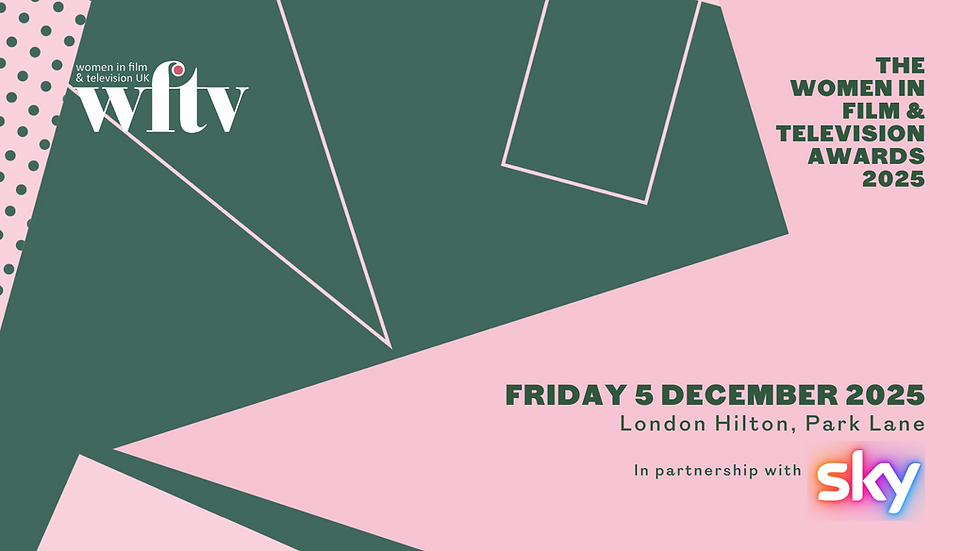WFTV Awards Interview: Baroness Floella Benjamin, OBE
- WFTV News

- Dec 9, 2019
- 3 min read
This year’s EON Productions Lifetime Achievement Award winner Floella Benjamin changed the face of children’s TV at a time when black faces on screen were almost unheard of. To adults of a certain generation, just hearing the name “Floella”, is enough to instantly transport them back to when they were three or four years old, listening to Floella telling them a story on Playschool.
Arriving in a cold, damp England from Trinidad, Floella and her family experienced the grim reality of being black in 1960s Britain. “Back in Trinidad I was told I was British and part of the Motherland, stood in the playground and sang God Save the Queen”, so it was a huge shock to Floella to find that the people of Britain did not see her as British at all.
Fighting one day with a boy who had been racially abusing her, she says she had a spiritual awakening and message: “You can’t change the colour of your skin and if he doesn’t like it then it’s his problem not yours. Start showing the world who you truly are. That was the day I stopped fighting with my fists and started fighting with my brain.”
“I stopped listening to what other people thought of me or called me, I’d just smile, and think I’ll show you differently, eventually I know it will happen”.

And then it did happen, having started her career in musical theatre, in 1973, Floella got her first break into TV on Within these Walls. Having never acted before, she gave the audition director an impressively long list of the dramas she claimed to have acted in. But her bluff was exposed, when she mentioned a show that the director had actually made.
Despite this, while lesser mortals might have felt they had pushed their luck too far, Floella kept pushing. She pleaded with the director to give her a chance: “I said that I know I can do this, let me do it and he said you’re very convincing.”
And so Floella’s TV career began, fast building up a portfolio of work on Play for Today, Play of the Month, the Gentle Touch and Bergerac. Being an actor, Floella found she was often free to watch children’s TV during the day and began to think that working on Playschool looked like the perfect job, so wrote to the BBC asking for an audition. “All it takes is confidence, if you believe you can do it, you will do it”. In 1976, that confidence saw Floella become the first black woman on children’s TV.

Arriving at the BBC with her hair braided in blue beads, BBC management thought Floella’s look might prove too much for viewers, so came up with an unusual compromise. For her first four days on Playschool, Floella would wear her beads and on Friday she would wear a wig. But shortly after her appearance on Friday, enquiries flooded in asking where Floella’s beads had gone. She was never asked to wear a wig on Playschool again.
One of the first things that bothered Floella on Playschool was that all the book illustrations put on screen were of white children. “I said to the producer, I am not speaking for all children because all the images are all white, can’t we have some black and Asian and Chinese faces? And she said we hadn’t noticed.” Floella’s argument was compelling, by 2:00pm that day all the illustrations had changed and she would play a key role in persuading children’s publishers to alter their illustrations too.
Floella went on to present and produce a large number of hugely successful children’s programme including Playaway, Jamboree, Hullabaloo, Treehouse and the RTS award winning drama Coming to England. As chair of BAFTA Television, she was responsible for creating the Children’s BAFTAs nearly 25 years ago.
Passionate in fighting for children and their rights, gradually Floella has become more involved in politics. In 2010, she became a life peer and in 2017 persuaded the government to alter legislation making it a statutory duty for ITV, Channel 4 and Channel 5 to provide children’s programming. Her other achievements include campaigning for a children’s minister, getting seat belts put on school buses and bringing in new legalisation for child performers. Floella believes she has a unique advantage when persuading politicians, because “most of the ministers are my Playschool babies.”

The passion and commitment for diversity that first began when Baroness Benjamin experienced racism on the streets of England as a child, continues to drive her politics and beliefs today. There remains much to do, but she says:
“If you give people opportunities, we can change the world”.
NB. This interview was first published in the brochure for the 2019 WFTV Awards supported by Sky, which took place on Friday 6 December 2019.



